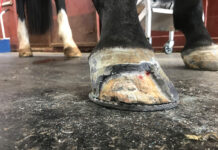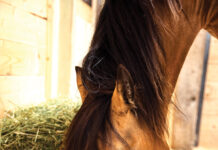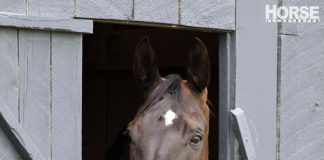
Could a horse show signs of discomfort before full-blown colic symptoms arise?
Q: My horse recently colicked with an impaction in her small intestine. For several days before the colic, she was sensitive in grooming on her upper left loin. Is it possible for an impaction to build up over a period of time?
A: It makes total sense to me that a horse would show mild, intermittent discomfort shortly before demonstrating full-blown colic signs when the cause of the abdominal pain is an impaction. That’s because an impaction – whether in the small intestine or large intestine – is a build-up of feedstuffs that, over time, completely obstruct the passage of material leading to a back-up in “the plumbing,” bloating and distension, and painful stretching of tissues. Blood and nervous supply can also be cut off, which is uncomfortable too.
From your question, it seems like eventually your mare showed typical signs of colic, such as pawing, looking at her side, lying down and getting up, rolling, not eating or drinking, not passing manure, sweating, and perhaps had a high heart or respiratory rate. I imagine when your veterinarian came out to examine and treat her, a combination of sedatives, pain-killers, fluids and electrolytes, and maybe oil and laxatives were used to encourage the impaction to soften and pass. When impaction colics do not respond to conservative, medical therapy, surgery is required to remove the blockage and hopefully restore the GI tissue to health and function. Therefore, it’s important to do what we can to prevent an impaction from forming in the first place.
- Feed high-quality hay that is not too immature and hard to digest or too mature and fine.
- Provide small meals frequently instead of large meals once or twice a day.
- Feed as little grain as possible.
- Make sure there is plenty of fresh, clean water at all times.
- Topdress electrolytes or salt to encourage drinking.
- Schedule preventive care including deworming and dental work.
- Make any changes to the diet, exercise, or stabling gradually.
Reports suggest that there is an increase in the risk of impaction colic in horses that have a sudden decrease in activity such as reducing regular exercise or changing from daily turnout to strict stall rest (due to an injury, surgery, illness, etc) so try to avoid this. Hopefully with this advice your mare will not suffer from an impaction colic again but at least you sound like an observant owner who knows her horse well and to call the vet at the first sign of a problem!






